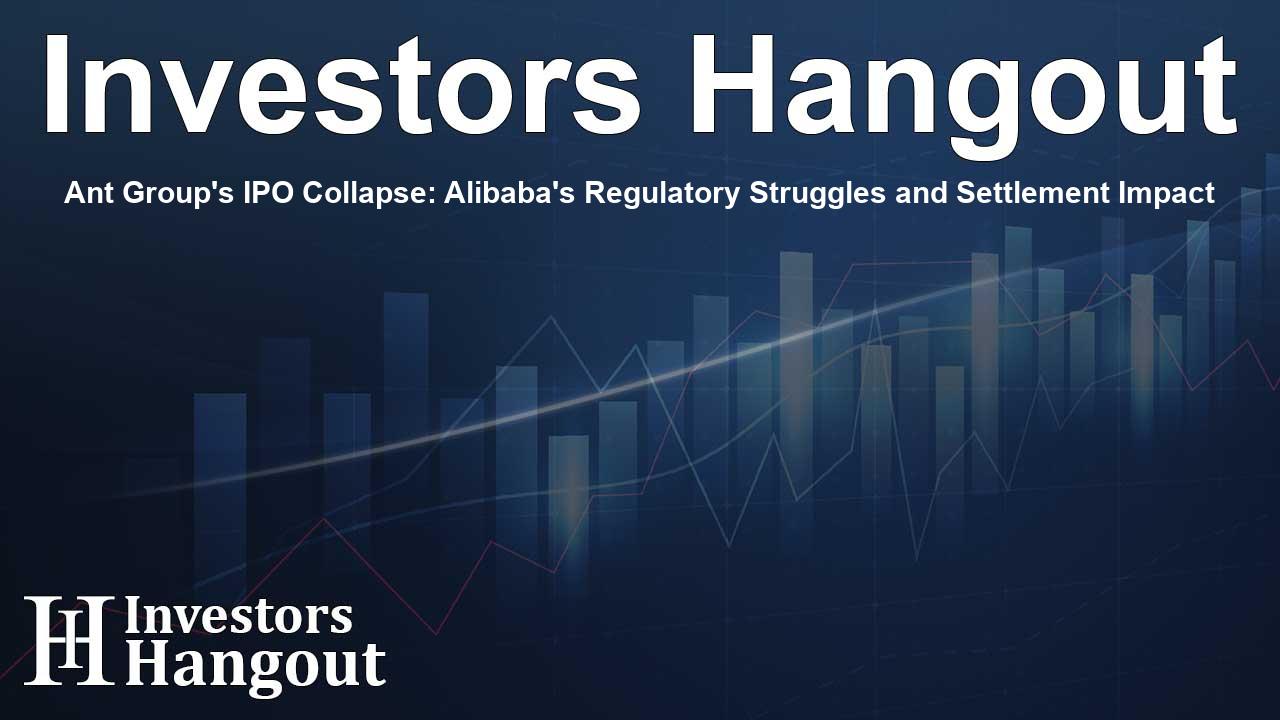Ant Group's IPO Collapse: Alibaba's Regulatory Struggles and Settlement Impact

The Unraveling of Ant Group's IPO
In the anticipation of an unprecedented initial public offering (IPO), Alibaba Group Holding Ltd (NYSE: BABA) positioned itself for a transformative moment with its affiliate, Ant Group, which was set to disrupt the financial technology landscape. However, the excitement quickly turned into turmoil.
Regulatory Roadblocks and Sudden Suspension
A major regulatory hiccup surfaced just days before the highly awaited IPO. Authorities unveiled serious concerns regarding Ant’s compliance with key banking regulations, leading to the shocking suspension of the IPO that was initially valued at $35 billion. This abrupt halt sent shockwaves through the market, causing Alibaba's stock to plummet 13% in a single day.
As the dust settled, it was revealed that the State Administration for Market Regulation initiated an antitrust investigation into Alibaba, scrutinizing its monopolistic practices. Investors felt misled about the regulatory risks associated with Ant Group, leading to a significant loss of trust and a decline in share value.
Investors' Legal Battle and Settlement
In a bid for justice, affected investors launched a class-action lawsuit against Alibaba, claiming that they were not properly informed about the regulatory obstacles that were on the horizon. In a move to alleviate the mounting pressure, Alibaba reached an agreement to pay $433.5 million to settle these accusations. This payment aims to compensate investors for the potential losses they incurred due to the sequence of events surrounding Ant's stalled IPO.
The Impact of SAMR's Regulations on Alibaba
As Alibaba’s influence in the market expanded, the Chinese government grew increasingly vigilant about its economic power. Following heightened concerns, the State Administration for Market Regulation (SAMR) rolled out stringent anti-monopoly regulations aimed directly at high-flying companies like Alibaba.
In November 2020, SAMR's actions were pivotal, as they announced new regulations specifically targeting the monopolistic practices prevalent in the digital marketplace. Despite ample warnings, Alibaba initially dismissed the critiques, describing them as unfounded slanders. However, as regulatory pressure mounted, Alibaba recognized the necessity of compliance.
Consequences of Ignoring Warnings
Despite the clear indications from the government, Alibaba continued its controversial practices. Following a series of developments, the company was investigated and ultimately fined a staggering $2.8 billion for its monopolistic behaviors. These regulatory actions directly impacted Alibaba's share price, which experienced a sharp decline, marking a significant financial setback.
Intriguing Political Dynamics Behind Ant's IPO
Jack Ma, Alibaba's visionary founder, maintained a substantial influence over Ant Group. However, extensive political risks loomed in the background. With Jack Ma controlling over 50.5% of Ant's shares and Alibaba holding a 33% stake, critical decisions regarding the IPO were fraught with complexities stemming from undisclosed investor interests. Notably, several private investors with conflicting ambitions regarding regulatory authorities remained hidden within convoluted ownership structures.
As investigations unfolded, the Chinese government became aware of these undisclosed interests, ultimately leading to the decision to suspend the IPO. This major setback resulted in a dramatic decline in Alibaba’s stock value, with shares falling from $310 to $222, reflecting a total decrease of 29% between November and December.
Challenges in Recovering Investor Confidence
To mend the fractured trust with investors, Alibaba's agreement to settle the lawsuit is intended to restore some level of confidence, albeit with lingering concerns about regulatory compliance. However, despite the company's efforts and the settlement, Alibaba's stock has struggled to regain its previous heights and currently trades at approximately $85.
Regulatory Compliance and Future Outlook
Recently, the Chinese market regulator confirmed that Alibaba had completed a three-year period of rectifying its alleged monopolistic behaviors. The company's leadership has framed this development as an opportunity for a fresh start and a commitment to nurturing a balanced and healthier growth trajectory within the digital economy.
Frequently Asked Questions
What caused the suspension of Ant Group's IPO?
The IPO was suspended due to regulatory concerns that Ant Group had bypassed key banking regulations.
How much is Alibaba paying in the investor settlement?
Alibaba has agreed to pay $433.5 million to settle claims from affected investors.
What were the main allegations against Alibaba?
Investors alleged that Alibaba failed to disclose critical regulatory risks regarding Ant Group's operations.
What impact did regulatory changes have on Alibaba’s share price?
The implementation of new regulations led to a steep decline in Alibaba’s share price, resulting in significant financial losses.
How is Alibaba addressing regulatory compliance moving forward?
Alibaba has committed to ongoing compliance efforts following confirmation from regulators that they have completed a three-year rectification process for previous violations.
About Investors Hangout
Investors Hangout is a leading online stock forum for financial discussion and learning, offering a wide range of free tools and resources. It draws in traders of all levels, who exchange market knowledge, investigate trading tactics, and keep an eye on industry developments in real time. Featuring financial articles, stock message boards, quotes, charts, company profiles, and live news updates. Through cooperative learning and a wealth of informational resources, it helps users from novices creating their first portfolios to experts honing their techniques. Join Investors Hangout today: https://investorshangout.com/
Disclaimer: The content of this article is solely for general informational purposes only; it does not represent legal, financial, or investment advice. Investors Hangout does not offer financial advice; the author is not a licensed financial advisor. Consult a qualified advisor before making any financial or investment decisions based on this article. The author's interpretation of publicly available data shapes the opinions presented here; as a result, they should not be taken as advice to purchase, sell, or hold any securities mentioned or any other investments. The author does not guarantee the accuracy, completeness, or timeliness of any material, providing it "as is." Information and market conditions may change; past performance is not indicative of future outcomes. If any of the material offered here is inaccurate, please contact us for corrections.